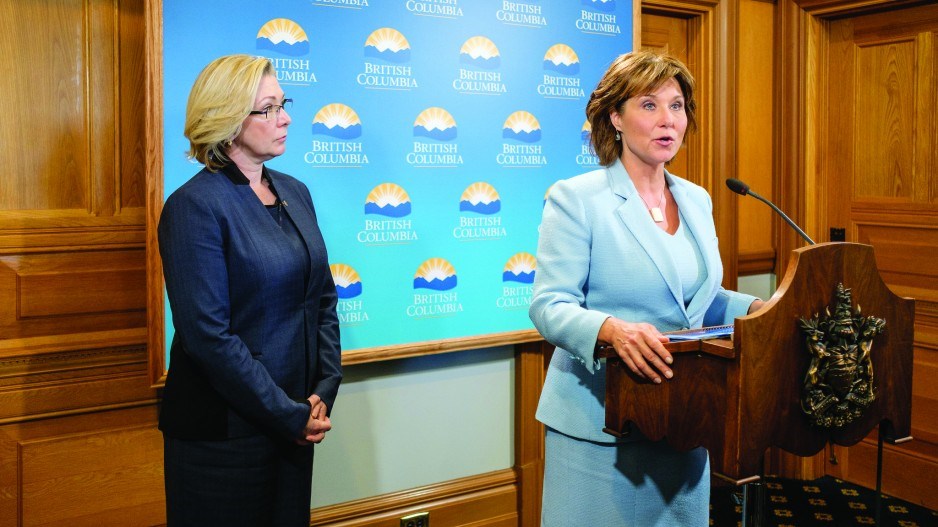BC will receive $25 million to $50 million a year from Kinder Morgan Canada over two decades for environmental initiatives and a guarantee that B.C. workers will get priority for construction jobs during the $6.8 billion Trans Mountain pipeline twinning project.
In making those commitments, Kinder Morgan has met the last of five conditions that B.C. established for supporting any oil pipeline project, Premier Christy Clark said last week, after announcing her government had issued the project an environmental certificate.
The environmental certificate B.C. issued last week comes with 37 conditions over and above the 157 set by the National Energy Board (NEB).
The B.C. government had hoped to avoid having to do its own environmental assessment on the pipeline project. That became possible in 2012, when the federal government streamlined federal environmental approvals, allowing provinces to substitute their environmental reviews with federal ones to avoid duplication.
But the BC Supreme Court ruled at the beginning of 2016 that the B.C. government still had to issue its own environmental certificate, even though it could rely on the federal NEB review process for its decisions.
Kinder Morgan welcomed B.C.’s support of the project, which presumably means it thinks it will have no problem meeting the additional 37 conditions.
“We believe this represents a positive outcome for our company, customers and for British Columbians and all Canadians who will benefit from the construction and operation of an expanded pipeline,” Kinder Morgan Canada president Ian Anderson said in a news release.
Clark said her government had reached agreements on two main points.
“First, that [Kinder Morgan Canada] will put British Columbians first when it comes to hiring for building and maintaining this project – that they will make sure that top qualified British Columbians are the ones that get these jobs and contracts in our province. And two, that we will have an unprecedented revenue-sharing agreement with Kinder Morgan.”
Under that agreement, the province will receive up to $1 billion over 20 years – $25 million to $50 million per year, depending on the pipeline’s annual revenue.
“Every penny of that will go into environmental protection, including a new B.C. Clean Communities Program,” Clark said.
Community groups will be able to apply for funding through the program for a range of environmental projects, from shoreline cleanups to fish hatcheries and habitat restoration projects.
When the Northern Gateway and Trans Mountain projects were first proposed, the B.C. government set five conditions for its support, including consultation with First Nations and the establishment of a “world-class” oil spill prevention and response regime. Four of the conditions had been met through the NEB process and special ministerial panel consultations.
One of the outstanding conditions was B.C. getting its “fair share” of revenue from the project. In agreeing to the $1 billion revenue-sharing deal, Kinder Morgan ticked off the last outstanding box.
As for the condition of having a world-class oil spill prevention and response plan in place, Clark took some credit for a decision late last year by the federal Liberal government to commit $1.5 billion toward an Oceans Protection Plan that includes beefing up the Canadian Coast Guard, with much of the spending to be in B.C.
In announcing her government’s support for the pipeline expansion project, Clark listed the economic benefits that will accrue for B.C.
They include:
•$19 billion in GDP growth over 20 years;
•$4.1 billion in revenue to B.C., including $2.2 billion in tax revenue and $512 million in property tax revenue; and
•$350 million for First Nations.




